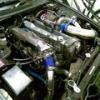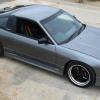Rb25 Turbo Kit
Announcements
-
Similar Content
-
Latest Posts
-
By myrbgivesmeheadaches · Posted
Thanks for the reply @GTSBoy this is is a hydraulic lifter engine. Yea right i did not realise the lifters were supposed to be compressible while installed. I could push them down but i had to lean almost my while body weight on them. I have never heard of a lifter/ lifters ticking only at hot idle and getting worse the hotter it gets. I have owned a few jdm cars with noisy lifters. This noise is slightly more subtle, it is more of a sharp gentle metalic tic than the solid and more loud tapping I've heard on lifters. I have used a metal rod, alloy tube, hose and stethoscope and could not find the source of the tick. But it appears to be loudest on the actual engine block behind the exhaust cam gear and next to the oil filter. I had mate (40 year old mechanic) go over it with me and he couldn't find it either.. Could it be a cam seal issue of some sort? Cheers -
This seems problematic and unlikely at the same time. Vanilla RB2Xs have hydraulic lifters. They do have "zero" clearance, but only when running with oil pressure inside them. When not running, you should be able to compress them and obtain heaps of clearance. RB26s and Neos have solid lifters. They should have ~0.3mm and ~0.5mm on the inlet and exhaust respectively. If they have zero clearance then bad things are happening. With nothing else being wrong, it would mean that the valves would be held slightly (ever so slightly) open when they are supposed to be closed and it should have all sorts of problems when running, caused by leakage in/out through the valves. Or, zero clearance can indicate severe valve seat recession. None of it is good. Have you used a piece of hose as a stethoscope to try to localise the noise?
-
By myrbgivesmeheadaches · Posted
Sorry for reviving an old post, but I'm having the same hot idle tick issue. Did anyone ever find out what it was? I have checked/ replaced Injectors Coils checked Lifter clerance (is at zero) Checked Cam lobes Replaced exhaust gasket and studs Would appreciate any advice this is driving me nuts -
What HVAC actuator is under the steering wheel? Do you mean on the RHS of the centre console, immediately to the left of your shin? If so, then yes, it is probably that one, because that is the mode door actuator, and from what I know, it's still a pain in the arse to replace. I don't know about whole dash out, but you certainly have to rip into the centre console section. I don't know if it's covered in the workshop manual, as I haven't spent much time looking at those parts of it. (and by "the workshop manual, I mean the R32 GTR one, which is the most comprehensive one we have, and it should be similar enough between that and later cars to serve as a guide).
-







Recommended Posts
Create an account or sign in to comment
You need to be a member in order to leave a comment
Create an account
Sign up for a new account in our community. It's easy!
Register a new accountSign in
Already have an account? Sign in here.
Sign In Now